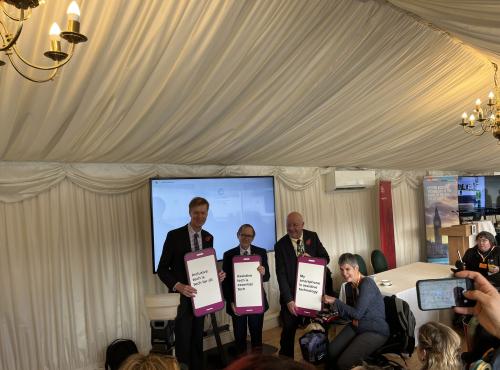Policy Connect on the King's Speech
Less than two weeks after securing a landslide General Election victory, Labour’s new Government has outlined its immediate legislative priorities with the first King’s speech of the new Parliament.
After our State Opening of Parliament drinks reception yesterday evening, Policy Connect has reviewed several of the 39 draft laws that the Government will seek to pass in this parliamentary session.
Sustainability
The centrepiece of Labour’s Energy and Infrastructure programme is GB Energy, a publicly owned energy investment and production company, which will be created by the Great British Energy Bill.
GB Energy will act as an investment vehicle for the Government’s energy plans, working with the private sector to invest and scale-up low-carbon technologies including wind, solar, nuclear, tidal power, low-carbon hydrogen, and Carbon Capture and Storage.
The Government is set to invest £8.3bn in GB Energy over this Parliament – partly funded by a windfall tax on oil and gas companies.
As outlined by Policy Connect’s Alainah Amer during the General Election, the Great British Energy Bill must be accompanied by “a clearer blueprint of what GB Energy can deliver and the role the company will play in delivering Labour’s ambitions of a decarbonised power system by 2030 and long-term energy security”.
Plans for GB Energy were also accompanied by a National Wealth Fund Bill which will align the UK Infrastructure Bank and the British Business Bank under a new National Wealth Fund that will invest £7.3bn in infrastructure and green industry over five years.
Health
Having failed to legislate for the Tobacco and Vapes Bill before the end of the previous parliament, Labour have re-introduced a gradual ban on smoking. With £14 billion lost each year due to people being off ill or out of work because of smoking-related illnesses, the ban is a positive measure that is likely to have significant health and economic benefits.
The Government’s plan to complete long-overdue reform of the Mental Health Act is also welcome. Policy Connect recently issued policy recommendations aimed at enhancing experiences and reducing detention rates for Black British men during a Westminster Symposium that concluded our partnership with Manchester Metropolitan University on the ‘ImprovE-ACT’ project.
As outlined in the ImprovE-Act's findings, the Government must ensure that a reformed Act prioritises transparency, effective communication, and humanised, culturally competent mental health support.
Education and Skills
The Skills England Bill will transfer responsibilities from the Institute for Apprenticeships and Technical Education to Skills England, a newly created body that will seek to develop a “single picture of national and local skills needs”.
Plans to reform England’s skills system follow the recent release of Skills 2030, a report by Policy Connect and the Skills Commission which outlined a vision for building a world-class skills system in England by 2030. The report included a recommendation to create a Skills and Workforce Council to oversee the delivery of a national skills strategy.
Dr. Peter Wilson recently collaborated with Hayley Pells of the IMI in an article for the Guardian which argued the importance of this body including SMEs in its representation.
With Skills 2030 also calling for reform of the Apprenticeship Levy, Policy Connect welcomes the Government’s intention to replace it with a ‘growth and skills levy’. Labour have previously suggested that it would permit up to 50% of employer payments to be spent on non-apprenticeship training.
Having held an evidence session with West Yorkshire Combined Authority during the Skills 2030 inquiry, Policy Connect is also pleased that the English Devolution Bill provides regional authorities with additional power to set skills policy. As outlined in Skills 2030, the Government should ‘provide regional authorities with “no-strings-attached" funding settlements for adult skills and an enhanced set of powers to shape skills provision in their area’.
The introduction of Skills England is promising, yet its full remit and responsibilities in higher education remain unclear. Furthermore, despite challenges such as the digital transformation, funding, and student welfare, the King’s Speech largely omits Britain’s higher education system.
Accessibility and English Devolution
The English Devolution Bill is set to provide regional authorities with a standard devolution offer that includes powers over transport, skills and employment.
Amidst the shift towards more localised transport decision making, Policy Connect and the Accessible Transport Policy Commission recently launched the ‘Accessible Transport Charter’, calling on Councillors and Mayors to close the transport accessibility gap and make transport accessible for disabled people.
With additional powers to set transport policy, it is crucial that regional authorities work to ensure that: a disabled people’s champion is appointed to all key transport bodies; local transport authorities establish accessibility co-production panels; accessibility is integrated into public transport strategies; our streets are free of clutter and accessible to all.
Whilst Labour’s first King’s Speech in fifteen years may be devoid of shocks, it represents an ambitious legislative programme, focussed on delivering the new Government’s core mission of driving economic growth in Britain.
With a plethora of proposed reforms and new government owned and run bodies, stakeholders across our policy areas now require clear timelines and concise details about how they will be implemented and operate.
The first King’s Speech of this Parliament was certainly historic, yet whether it proves transformative will depend on the new Government’s capacity to match ambition with detail and delivery.



